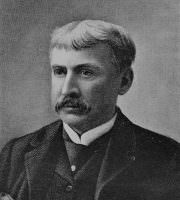About Bret Harte
Francis Brett Hart (Bret Harte), born August 25, 1836 in Albany, New York, and died May 6, 1902 in Camberley, was an American poet and writer, known for his works on the life of the pioneers in California. He was born Francis Brett Hart in Albany, New York, named after his great-grandfather Francis Brett. During his childhood, his father changed the spelling of their surname to Harte. Subsequently, the young man preferred to keep his middle name and became Bret Harte.Harte published his first texts at age 11, a satirical poem titled Autumn Musings, now lost. Rather than attracting praise, the poem garnered ridicule from his family. As an adult, he recalled to a friend, 'Such a shock was their ridicule to me that I wonder that I ever wrote another line of verse'.
He left to try his luck in California in 1853 and settled in San Francisco in 1854 where he did many odd jobs: miner, teacher, messenger and journalist. Stagecoach clerk, apothecary, tutor, mint secretary, then editor of the Overland Monthly, he spent part of his life on the coast of northern California, in the Humboldt Bay miners' camp, now the town of Arcata.
Harte published his first serious poem, as a second attempt, in The Golden Era in 1857 and, in October of that same year, his first prose piece on A Trip Up the Coast. He was hired as editor of The Golden Era in the spring of 1860, which he attempted to make into a more literary publication. Among his writings were parodies and satires of other writers, including The Stolen Cigar-Case featuring ace detective Hemlock Jones, which Ellery Queen praised as probably the best parody of Sherlock Holmes ever written.
He made a name for himself by publishing The Luck of Roaring Camp, in 1868, where he described the Far West and its exoticism. His caricatural characters like Colonel Pendleton, a killer with a big heart, will inspire the directors of many westerns as well as the stories of Mark Twain. Harte's fame increased with the publication of his satirical poem Plain Language from Truthful James in the September 1870 issue of the Overland Monthly. The poem became better known by its alternate title The Heathen Chinee after being republished in a Boston newspaper in 1871. It was also quickly republished in a number of other newspapers and journals.
He died in Camberley, England, in 1902 of throat cancer and is buried at Frimley.
Browse all poems and texts published on Bret Harte









